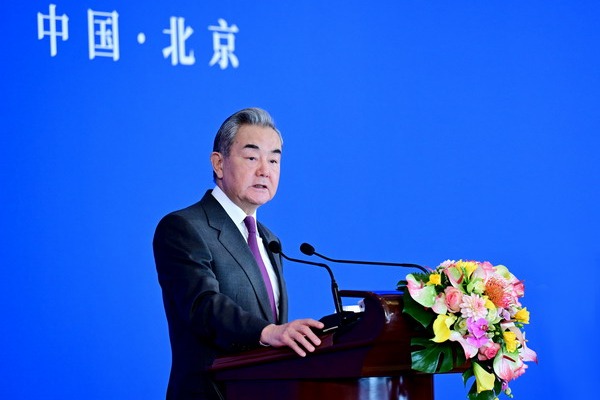Globalization efforts counter protectionist policies

Amid geopolitical tensions and fresh economic headwinds arising from US trade tariffs, China continues to support globalization and multilateralism, serving as a propeller for the world economy, experts say.
"China's role and significance as a key defender and driver of the future global economy and multilateralism are growing more important than ever," said Yangchoon Kwak, a senior specially appointed professor at Rikkyo University's College of Economics in Japan.
Kwak said the world is witnessing an "incomprehensible reversal" as the United States, which used to advocate a capitalist trade order of "freedom, nondiscrimination and multilateralism" after World War II, has now advanced protectionist policies under the slogan of "America First".
In contrast, China has moved to defend free trade as it increasingly takes on the characteristics of an advanced economy, Kwak noted.
Since joining the World Trade Organization in 2001, China has played an active role in economic globalization. The country has made numerous efforts in reform and opening-up, with its overall tariff rate dropping from 15.3 percent in 2001 to 7.3 percent now, according to a white paper released by the State Council Information Office in April.
As the world's second-largest economy, China has accounted for about 30 percent of global economic growth annually in recent years, according to the National Bureau of Statistics.
China has not only contributed to globalization and multilateralism, but has also sought to reform the system to make it more balanced and inclusive for international cooperation, according to the Myanmar Institute of Strategic and International Studies.
The institute noted that China-proposed projects such as the Global Development Initiative, the Global Security Initiative and the Global Civilization Initiative have been covenants of principles and frameworks of real multilateralism.
The US has imposed a crushing 44 percent "reciprocal tariff" on earthquake-hit Myanmar, and the institute said the Southeast Asian country needs to work with its partners to face the challenge.
For example, the Regional Comprehensive Economic Partnership, a free-trade pact that brings together the Association of Southeast Asian Nations and five major trading partners, including China, will bring trade growth, connectivity, expanded market access and infrastructure upgrades, the institute said.
"The United States is a country that the global economy cannot ignore at present, but it is not a country upon which the global economy must depend forever," said Hidetoshi Tashiro, chief economist at Japanese consultancy Infinity LLC.
As countries across the world face tariff hikes by the US, Tashiro said international justice might have been completely buried by Washington's actions if China had not stood firm in advocating for international justice.
"If international justice is lost, poor nations with limited populations and scarce resources will forever be unable to assert any demands on the global stage," said Tashiro, adding that China is upholding the idea of a multilateral economic order while working to establish a new basis for it.
With Japan-China trade expanded under the RCEP, Tashiro said China has overtaken the US as the largest export destination for Japanese sake, or rice wine, and Chinese companies have begun acquiring Japanese sake producers.
"Many people overlook the fact that consumers in all countries choose to obtain the best value at the lowest cost, rather than prioritizing 'Made in China'," said Kang Ho-gu, director of the Sino-Korea Economy/Society Institute.
The essence of free trade is mutual and fair, and China is also facing competitive pressure due to rising costs, said Kang, who is also a visiting professor of the Graduate School of International Studies at Chung-Ang University in South Korea.
"Against this backdrop, China still advocates free trade, which demonstrates its willingness to engage in fair competition with other nations and its commitment to improving the whole human society," Kang said.
Noting that China has said that there are no winners in a tariff war, Kang said tariff wars harm public welfare and global prosperity, and true progress comes from active participation and healthy competition.
Given the current stagnation of the global economy, no single country can resolve the situation on its own. It is vital for all nations to work together to tackle challenges, and doing so requires a mid- to long-term perspective, said Kwak of Rikkyo University.
China and the world must recognize that great unity is the only path out of the current crisis if the US is trying to implement a strategy of "divide and rule" with its "reciprocal tariffs", Kwak said.
Contact the writers at kelly@chinadailyapac.com

































